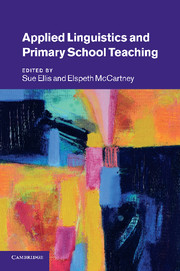Book contents
- Frontmatter
- Contents
- List of figures
- List of tables
- Notes on contributors
- Preface
- Editors' notes and conventions
- Introduction
- Part I Policy and diversity in the twenty-first-century primary school
- Part II The range and focus of applied linguistics research
- Part III Empowering teachers and teachers' use of knowledge
- References
- Index
Preface
Published online by Cambridge University Press: 26 April 2011
- Frontmatter
- Contents
- List of figures
- List of tables
- Notes on contributors
- Preface
- Editors' notes and conventions
- Introduction
- Part I Policy and diversity in the twenty-first-century primary school
- Part II The range and focus of applied linguistics research
- Part III Empowering teachers and teachers' use of knowledge
- References
- Index
Summary
Many of the chapters in this edited collection began as papers given at an invited seminar series sponsored by the University of Strathclyde, the British Association of Applied Linguistics and Cambridge University Press. The seminars, Applied linguistics: what should primary teachers know, and how?, explored the relationship between applied linguistics, primary education and teacher knowledge. They sought to review some of the ways that applied linguistics impacts on the modern primary school curriculum and our understanding of it, and to explore the type of understandings of applied linguistics that could empower primary school teachers to create an effective and appropriate curriculum for all children in their charge.
In proposing the seminar series, four important themes were considered. One was the direct contribution that applied linguistics researchers have made to the content of the language and literacy curriculum in primary schools and to how it is framed and taught. A second explored the role of applied linguistics in understanding how language is used in schools and communities, and the wider implications of this for teachers and education policy makers. The third theme concerned the implications of legislation for inclusive education: as primary school classes increasingly include children with speech, language and communication difficulties, class teachers must work effectively with professionals such as educational psychologists, learning-support teachers and speech and language therapists to adapt curriculum content and delivery in order to support and develop the speech, language and communication of such educationally vulnerable children.
- Type
- Chapter
- Information
- Applied Linguistics and Primary School Teaching , pp. xix - xxPublisher: Cambridge University PressPrint publication year: 2011

